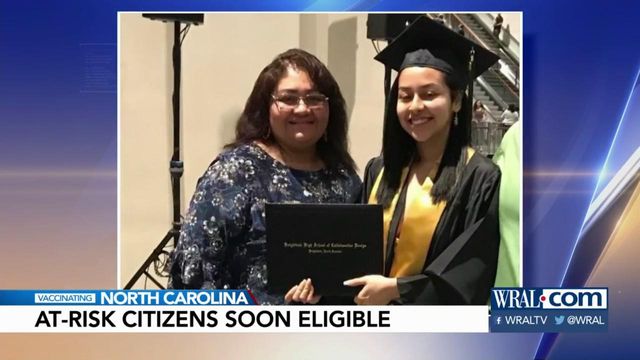All NC frontline workers now eligible for vaccines, people with health conditions in 3 weeks
Frontline workers in "essential" industries will be eligible to get vaccinated against coronavirus starting Wednesday, and people with underlying health conditions that put them at higher risk from the virus will be eligible in three weeks, Gov. Roy Cooper said Tuesday.
Posted — UpdatedThat includes grocery store and pharmacy employees, restaurant staff, U.S. Postal Service workers, library workers, clergy, university faculty and staff, paramedics, police officers, firefighters, veterinarians and elected officials.
On Tuesday, Cooper announced people with underlying health conditions that put them at higher risk from the virus and who don't already fall into Groups 1-3 will be eligible to get vaccinated in three weeks.
No timeline had previously been set for people with health conditions, but he said Tuesday they could start signing up for vaccination appointments on March 24.
Cohen said the state should receive more than 80,000 doses of the Johnson & Johnson vaccine this week, as well as 215,000 first doses of the other two vaccines – far more than the roughly 150,000 doses the state has received in recent weeks.
"The state and our providers continue to work extremely hard to get people vaccinated in a way that’s fast and fair,” Cooper said. “The third vaccine and improving vaccine supply for the two we already are getting will help us get more people vaccinated more quickly."
More than 2.5 million vaccinations have been administered statewide to date, meaning about 15 percent of North Carolinians have gotten at least one dose and nearly 9 percent are fully vaccinated. Nationwide, 7.9 percent of people are fully vaccinated.
Vaccinations for Group 1, which included health care workers and residents and staff of long-term care facilities, started in December. The state started vaccinating Group 2 – people age 65 or older – in January. Officials last month put teachers, school personnel and child care workers at the front of Group 3 to accelerate the reopening of schools.
The rest of Group 4 includes people who work in industries such as defense, energy, communications, water and wastewater treatment, public works and financial services.
People with developmental disabilities who have received in-home care or community care for at least 30 days got bumped up even higher in the vaccination priority list to Group 1, making them immediately eligible, Cohen said.
Tanya Holland was overjoyed at that news. She's been desperate to get her 22-year-old son, Chris, who has Down syndrome, vaccinated.
"Yesterday, he pulled up his sleeve and pointed at his arm, and that’s his way of letting me know, 'I’m ready for my shot,'” Holland said. “I’m still really disappointed that they were bumped to last place in line [earlier]. I think it’s encouraging to know at least we have a date on the calendar that we can point to and say this will be the day that the gate opens for my child."
Chris has been stuck inside since the start of the pandemic, she said. His day program has been put on hold, and daily activities he benefited from have been paused.
“Were he to catch COVID, the outcome would be disastrous," Holland said. "For this mom, it’s just never been worth the risk.”
Cohen said the new Johnson & Johnson doses will be distributed among providers in 33 counties that are ready to deliver the one-shot vaccine.
"We want folks to know what they are getting. Are they getting the one-shot vaccine, or do they need to go to two separate appointments?" she said, noting that providers are holding separate clinics for the Johnson & Johnson vaccine than for either of the others, which both require a two-shot regimen.
But she added that shipments of that vaccine won't be as regular as the weekly allotments of Pfizer and Moderna vaccines, noting that the state won't receive any Johnson & Johnson doses next week.
"We do expect, over the course of March, to receive a lower amount," she said. "By the last week of March [and the] first week of April, we should be seeing a pick-up in the number of Johnson & Johnson vaccines."
Cohen said she plans to get the Johnson & Johnson vaccine later this week. Cooper is scheduled to be vaccinated Wednesday, and he said doesn't care which vaccine is used.
"I'm happy to get any vaccine right now," he said. "I think it's important for us to get to everybody."
Related Topics
• Credits
Copyright 2024 by Capitol Broadcasting Company. All rights reserved. This material may not be published, broadcast, rewritten or redistributed.






